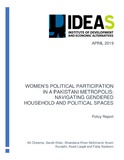| dc.contributor.author | Cheema, Ali | |
| dc.contributor.author | Khan, Sarah | |
| dc.contributor.author | Khan Mohmand, Shandana | |
| dc.contributor.author | Kuraishi, Anam | |
| dc.contributor.author | Liaqat, Asad | |
| dc.contributor.author | Nadeem, Fatiq | |
| dc.coverage.spatial | Pakistan | en |
| dc.date.accessioned | 2019-05-14T09:33:41Z | |
| dc.date.available | 2019-05-14T09:33:41Z | |
| dc.date.issued | 2019-04 | |
| dc.identifier.citation | Cheema, A.; Khan, S.; Khan Mohmand, S.; Kuraishi, A.; Liaqat, A. and Nadeem, F. (2019) 'Women's Political Participation in a Pakistani Metropolis: Navigating Gendered Household and Political Spaces', IDEAS Policy Report, April, Lahore: Governance and Political Economy Unit, Institute of Development and Economic Alternatives | en |
| dc.identifier.uri | https://opendocs.ids.ac.uk/opendocs/handle/20.500.12413/14491 | |
| dc.description.abstract | The male–female gap in voter turnout in the 2018 Pakistani general elections stood at 9.1 per cent, with 11 million fewer women exercising their right to vote than men. This report shows that the largest city in each of Pakistan’s four provinces did much worse
in terms of gender inequality in voter turnout in compared to the remaining constituencies of each province. The report argues that it would not be possible to forge an effective agenda of action to address the gender inequality in participation in big cities without recognising that it is a product of a complex dynamic between women, social attitudes in households and the gendered nature of political space and political engagement. The main aim of the report is to provide an understanding of this complex dynamic by unpacking the constraints women face in exercising political agency. It is led by a simple question – why does a gender gap in political participation exist in a big city context?
We answer this question by using evidence from qualitative interviews and focus group discussions with close to 250 women and men and an original baseline citizen survey of 2,500 randomly selected households across 7 of Lahore’s 14 national assembly constituencies and one third of the city’s local government electoral wards. Within each household, one man and one woman member were randomly selected and interviewed, providing us with a total sample of 5,000 respondents. We also draw on an original turnout survey that validated the turnout of women and men in Election 2018 by observing indelible ink marks on the thumbs of the respondents within two days of the elections. | en |
| dc.language.iso | en | en |
| dc.publisher | The Institute of Development and Economic Alternatives | en |
| dc.rights.uri | http://ideaspak.org/governance-and-political-economy/ | en |
| dc.subject | Gender | en |
| dc.subject | Governance | en |
| dc.title | Women's Political Participation in a Pakistani Metropolis: Navigating Gendered Household and Political Spaces | en |
| dc.type | Other | en |
| dc.rights.holder | © Institute of Development and Economic Alternatives (IDEAS) 2019 | en |
| dc.identifier.externaluri | http://ideaspak.org/political_economy/womens-political-participation-in-a-pakistani-metropolis-navigating-gendered-household-and-political-spaces/ | en |
| dc.identifier.team | Power and Popular Politics | en |
| rioxxterms.funder | Department for International Development, UK Government | en |
| rioxxterms.identifier.project | PO7239 Action for Empowerment and Accountability Programme | en |
| rioxxterms.version | VoR | en |
| rioxxterms.funder.project | 5cecb4e4-a784-4ff9-b559-66fc23b1b999 | en |

